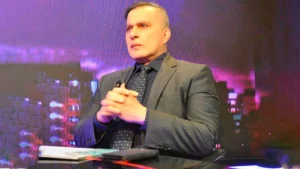Tarek William Saab evolved from a youthful revolutionary into Venezuela’s Chief Prosecutor.
His path took him through roles as a Chavismo supporter, poet, Buddhist, political party founder, governor, Ombudsman, and rock promoter.
Today, he’s a central figure in Venezuela’s leadership, influencing its direction for over two decades.
In 2017, Saab became Chief Prosecutor, a position given by the National Constituent Assembly.
This group took control after the 2015-elected parliament faced national protests and became ineffective.

As a prosecutor, Saab has tackled charges against Venezuela. He addresses accusations of government overreach and crimes against humanity during Nicolás Maduro’s term.
These issues have reached global forums, including the UN and the International Criminal Court.
Saab first earned acclaim for defending Caracazo victims in 1989. Then, economic turmoil led to deadly clashes, poorly managed by the government.
He became a trusted journalist source in Caracas, known for his friendly nature. Saab helped shine a light on unresolved stories and police issues.
Born in El Tigre to Lebanese parents, Saab, now 62 and divorced, was inspired in the 1980s by Douglas Bravo.
He joined the radical Ruptura, challenging the status quo of electoral democracy.
The rise of Chavismo in 1999 changed Saab. Once known for his kindness and journalistic insight, he became more critical, especially as Anzoátegui’s governor (2004–2012).
Post-divorce, Saab embraced a more relaxed style and supported rock events in Puerto La Cruz. His new tattoos symbolized a youthful, rebellious spirit.
Evolution of Saab’s Approach and Challenges
Over time, Saab’s approach became more guarded. He struggled with opposition trust and reacted strongly to critiques, especially on human rights.
He resented comparisons to other Chavistas accused of power abuses.
Saab, defending Maduro’s government globally, represents a revolutionary state beyond traditional democracy.
In 2017, his son, Yibram, opposed his views during political unrest. Saab asked for understanding of his son’s opinions, despite social media backlash.
Saab claimed his office fought a “transnational crime cartel.” He criticized his predecessor, Luisa Ortega Díaz, for her approach to anti-corruption.
Facing sanctions for democracy threats and biased investigations, Saab also authored 13 poetry books and remained active in cultural circles.
He initiated strict animal rights laws and addressed social media-driven public concerns, promoting swift justice.
Saab criticized the International Criminal Court’s interference, seeing it as unjustified global pressure on Venezuelan justice aimed at upholding human dignity.

